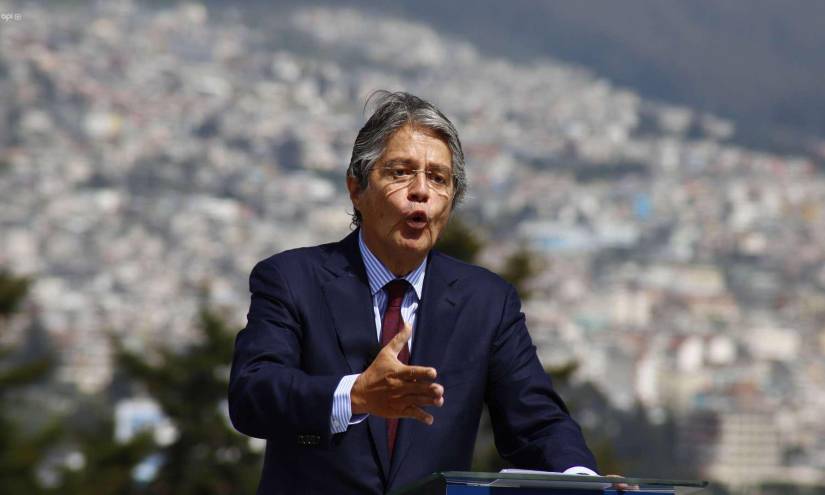RIO DE JANEIRO, BRAZIL – The president of Ecuador, Guillermo Lasso, completes his first 100 days in office with important advances in the anti-virus vaccination plan. However, he also carries the heavy burden of an economic crisis inherited from his predecessor, Lenín Moreno.
Although he will do it some days late, the center-right leader will apparently score a first significant triumph by fulfilling his promise to immunize some 9 million Ecuadorians against Covid-19, 60% of the population, in his first 100 days of government, which will be fulfilled this Tuesday, August 31.
Read also: Check out our coverage on Ecuador
As of this Friday, according to the official Vaccinometer, the new government had administered around 16 million doses, compared to around two million of its predecessor, Lenín Moreno, since it started the plan on January 21 until the change of government on May 24.

Almost 10 million have the first dose and, of them, a little more than eight million have the complete pattern, according to the Ministry of Health, which expects to reach the 9 million fully inoculated mark a week after the deadline promised in the election campaign because, in the beginning, they stopped the plan for a few days to measure and distribute it.
VACCINATION FIRST
In a public act this Friday, Lasso thanked the collaboration of “friendly governments” for the accelerated supply of vaccines and assured that the success of the plan is demonstrated in “a decrease of the rates of contagion and mortality” and “will surely have an impact on the recovery of the economy and other fields of the social life of the country”.
Since the beginning of his mandate, Lasso has focused all his efforts on accelerating the vaccination plan initiated by Moreno, but which suffered from delays and scandals of alleged corruption.
The new president even plans to reach 90% immunization of the population by the end of the year, which will allow the country to return to a new normality, necessary to underpin the economic recovery.
At the same time, he has initiated an aggressive plan to improve its trade relations with new agreements with the USA and Mexico. The latter is vital for Ecuador to become a full member of the Pacific Alliance, like Chile, Peru, and Colombia, which already have such status.
During a visit by Lasso to Mexico a few days ago, the two countries announced the unblocking of the stalled negotiation.
RECOVERING THE ECONOMY
On the economic front, the Ecuadorian president has tough tasks pending on the horizon, as he must weather the tails of a crisis that began in 2019 and was aggravated by the pandemic, which has already provoked the agitation of unions and social groups.
The Confederation of Indigenous Nationalities (Conaie) demands he eliminate a decree for fixing fuel prices through a system of bands that has caused the rise in gasoline prices, with its consequent effects.
And the labor unions, especially the Frente Unitario de Trabajadores (United Workers Front), the largest workers’ union in the country, abandon the idea of privatizations and reforms that imply labor precariousness.
These social demands were already on the table of discussions during Moreno’s government. In October 2019, endured a harsh indigenous protest demanding the repeal of a decree that eliminated fuel subsidies.
Moreno had to give in and eliminated such a decree, but, months later, in the middle of the pandemic, he issued the new pricing regulation that had a similar effect and some savings for the public coffers, the same objective of the initial decree.
SOCIETY CANNOT TAKE ANY MORE CUTS
To boost productive development, Lasso has ratified that he will maintain the same policy and that he does not rule out privatization processes as economical alternatives, given the tightness of being able to resort to loans from the multilateral, which were already exploited by his predecessor, some $7 billion in 2020.
For economist Pablo Davalos, a professor opposed to adjustment policies, the current government seems to be the continuation of the previous one since, in his opinion, it is totally in tune with Moreno’s government.
However, he believes that possible policies to eliminate subsidies, the deepening of a mining and oil extractivist model, or privatization strategies would clash with reality: “People can no longer bear the weight of the crisis.”
“The country is not prepared to assume adjustments, there are no economic or social conditions” for new shock programs such as those applied by Moreno, under the protection of the credit agreements with the International Monetary Fund (IMF), added the analyst.
And he assures that Lasso maintains his attachment to the IMF and that, with that logic, he would seek to pass tax and fiscal reforms that, apparently, could meet with the resistance of several parliamentary groups.
The economist even intuits that “a train wreck” could occur between the political system and society with this scenario.

